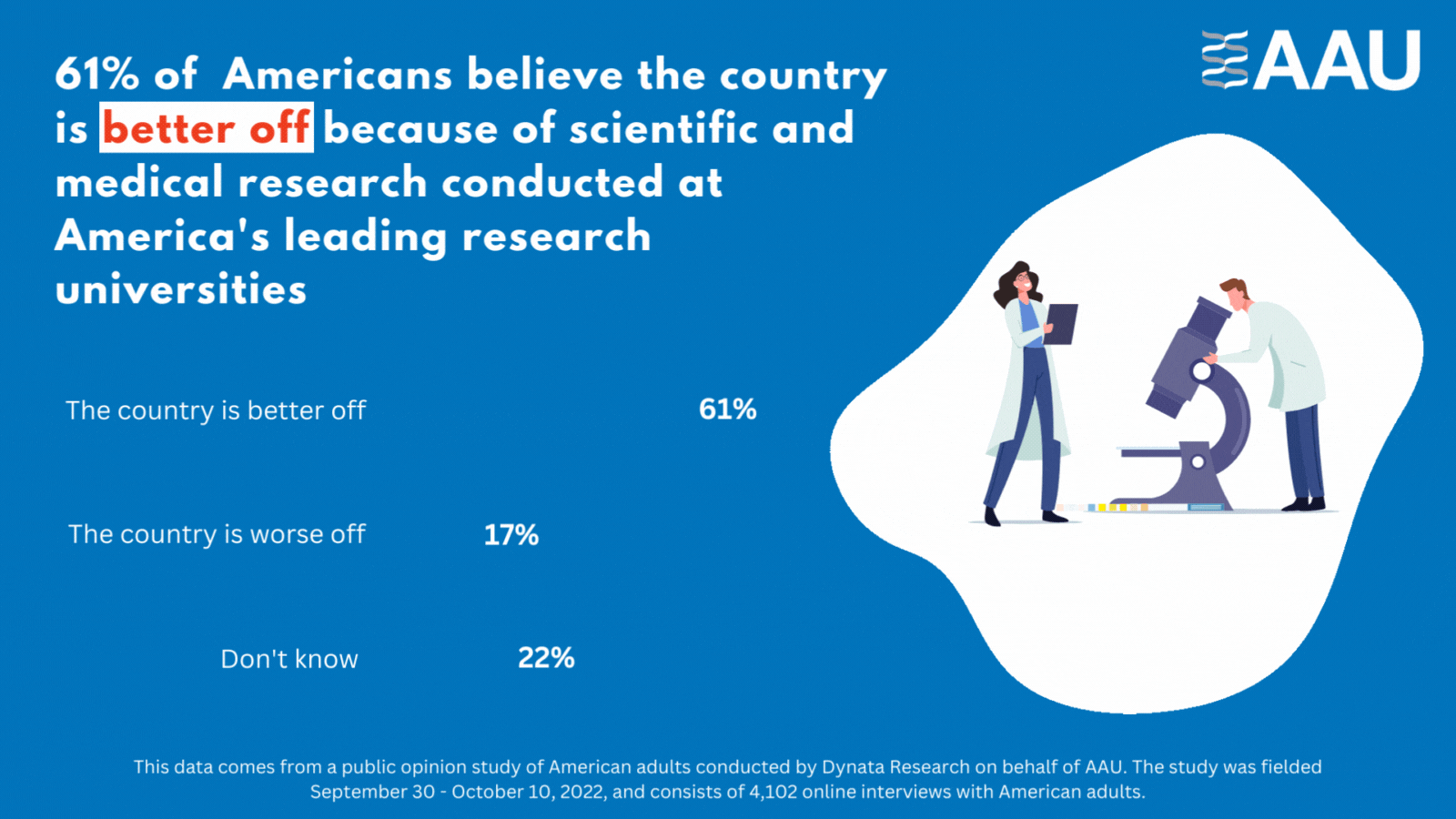 New Report Provides Blueprint for Advancing Equity and Excellence in Undergraduate Education
New Report Provides Blueprint for Advancing Equity and Excellence in Undergraduate Education
Earlier this week, the Boyer 2030 Commission, co-chaired by AAU President Barbara R. Snyder and Association of Public and Land-grant Universities President Emeritus Peter McPherson, released a new report providing a blueprint for how research universities in the United States can advance both excellence and equity in undergraduate education.
Convened by the Association for Undergraduate Education at Research Universities, the Boyer 2030 Commission consisted of leaders from the higher education, philanthropy, and business sectors. The commission’s new report, titled “The Equity/Excellence Imperative: A 2030 Blueprint for Undergraduate Education at U.S. Research Universities,” is a follow-up to a report issued by the original Boyer Commission in 1998.
“The world is a very different place than it was in 1998, and that is why a new Boyer Commission was needed to recommend ways to guarantee excellence and equity in undergraduate education for today’s college students,” said President Snyder. The report challenges the belief that “universities can have equity only at the expense of excellence – and excellence only at the expense of equity.” As President Snyder told The Chronicle of Higher Education, “In today’s world, you cannot be an excellent institution if you are not also an equitable, inclusive institution.”
The report includes recommendations for how research universities can achieve both excellence and equity in undergraduate education by eliminating barriers to access and degree completion for students from underrepresented or disadvantaged backgrounds; promoting excellence in teaching and student advising; creating opportunities for “high-impact educational experiences,” such as internships; fostering belonging and well-being on campus; and preparing students for life, work, and participation in a democratic society.
Each recommendation in the report, said President Snyder, “is informed by the significant advances we’ve made in technology and in understanding effective teaching methods since the original Boyer Commission issued its report.” The report also provides real-world examples of how universities are working to promote equity and excellence in undergraduate education.
 AAU Joins Top Businesses and Organizations in Calling on Congress to Protect Dreamers
AAU Joins Top Businesses and Organizations in Calling on Congress to Protect Dreamers
Yesterday, AAU joined more than 80 top businesses and organizations in calling on Congress to take legislative action and protect recipients of the Deferred Action for Childhood Arrivals (DACA) program. In a letter to congressional leaders, the Coalition for the American Dream, which includes industry leaders like Apple, Google, Meta, and Microsoft, noted that businesses, already suffering from workforce challenges, would “face another crisis if Congress fails to act on an issue that has strong bipartisan support from the American people.”
The DACA program provides protection from deportation for nearly 600,000 college students and other young people who were brought to the United States as children through no fault of their own; they are sometimes referred to as “Dreamers.” The 5th U.S. Circuit Court of Appeals recently declared the program illegal (AAU President Snyder called the ruling “misguided”).
If the program ends, Dreamers would be unable to work in the United States and would lose protections from deportation. This would cause severe consequences for American businesses and the U.S. economy. “When the last DACA recipient’s work permit expires, the U.S. will have lost more than 500,000 jobs, and the U.S. economy will lose as much as $11.7 billion annually – or roughly $1 billion monthly – in wages from previously employed DACA recipients,” the letter noted.
The coalition emphasized that Congress could ward off the pending crisis by passing bipartisan measures that have already been introduced in the House and the Senate. “We urge you to swiftly pass legislation this year that will help Dreamers, American businesses, and our country,” it added.
 ICYMI: Barbara’s Blog: Dreamers Face a Nightmare
ICYMI: Barbara’s Blog: Dreamers Face a Nightmare
 Tech Companies Call on Congress to Boost NSF Funding
Tech Companies Call on Congress to Boost NSF Funding
Yesterday, CEOs of more than 30 major tech companies, including IBM, Amazon Web Services, Intel, and Samsung, sent a letter to congressional leaders asking them to fund the National Science Foundation at $11.89 billion in FY23. This level of funding for the science agency was authorized, but not appropriated, in the recently passed bipartisan CHIPS and Science Act.
The CEOs’ letter emphasized the significance of the NSF both in funding research that has led to global technological innovations and in cultivating STEM talent. “NSF has seeded foundational research that has spawned the commercialization of technologies that have revolutionized our world – including semiconductors, GPS, search engines, and the Internet itself,” the CEOs wrote. Further the NSF has championed STEM talent by funding academic research and will continue playing “a decisive role in fueling a STEM-trained workforce,” they added.
The CEOs asked Congress to fulfill the promises of the CHIPS and Science Act and help the country stay ahead of global competitors by sufficiently funding the NSF, including its new directorate for Technology, Innovation, and Partnerships, in FY23 and in each of the next four fiscal years. “Now, more than ever, our companies and our country require expanded investment in basic and applied research to fuel the United States’ economic competitiveness and to strengthen our national security,” they wrote.
 FEATURED RESOURCE: Barbara’s Blog: Making America Competitive Again
FEATURED RESOURCE: Barbara’s Blog: Making America Competitive Again
TFAI Urges Appropriators to Meet Commitment on CHIPS
Faculty at Several AAU Institutions Honored with MacArthur Fellowships
The MacArthur Fellowship, commonly known as a “Genius Grant,” is an $800,000 no-strings-attached prize awarded to 20-30 extraordinarily talented and creative individuals each year. Thirteen of the 19 academics named in the 2022 class of MacArthur Fellows are affiliated with AAU universities. A complete list of this year’s awardees is available here.
News of Interest
AP News: Cell Biologist from Duke Named New President of MIT – Yesterday, the Massachusetts Institute of Technology announced that Sally Kornbluth will take over as the university’s next president starting January 1, 2023. Kornbluth is a cell biologist and has served as provost at Duke University for the past eight years. She will succeed L. Rafael Reif, who has served as MIT’s president for the last 10 years.
NPR: The College Enrollment Drop Is Finally Letting Up. That’s the Good News – New data from the National Student Clearinghouse shows that undergraduate student enrollment dropped by 1.1% between fall 2021 and fall 2022. All types of institutions, including public and private nonprofit four-year universities, community colleges, and for-profit universities, experienced a decline in enrollment. Community colleges saw the smallest decline in enrollment, at 0.4%.
The Chronicle of Higher Education: America’s Ph.D. Production Experienced Its Steepest Drop on Record – According to the new Survey of Earned Doctorates, U.S. universities awarded 3,000 fewer doctorates in 2021 than the year before. The numbers fell for all types of doctoral institutions and disciplines and across all racial/ethnic groups except Native Americans.
AP News: Student Loan Forgiveness Application Website Goes Live – The new student loan forgiveness application is now live on studentaid.gov. The simple application asks for the borrower’s name, Social Security number, contact information, and date of birth, and is open through December 31, 2023. The administration announced that eight million Americans had already applied for loan relief.
Higher Ed Dive: Most Americans Oppose Laws That Restrict Faculty Speech, Poll Finds – According to a new YouGov survey, 54% of Americans oppose legislation regulating what college professors can discuss in classrooms. Older Americans are more likely to be in opposition than younger Americans; roughly one in three Americans, however, say “professors have too much freedom to speak their minds in the classroom.”
Featured Research

Light-Based Therapy Weakens Antibiotic-Resistant Bacteria
Researchers at Texas A&M University and Brazil’s University of São Paulo are working together to combat antibiotic-resistant bacteria strains with light. The researchers have found that antimicrobial photodynamic therapy – “a chemical reaction triggered by visible light” – can weaken bacteria to a point where they can be easily eliminated by low doses of current antibiotics.

Dramatic Rise in Cancer in People Under 50
A new study by Harvard Medical School researchers has found that more people under the age of 50 are being diagnosed with early-onset cancers than ever before and that the risk is likely to continue to rise for subsequent generations. The researchers said that it is unlikely that the rise can be attributed to enhanced cancer screenings alone and that “alcohol consumption, sleep deprivation, smoking, obesity, and eating highly processed foods” may be partly to blame.
Stat of the Week

Majority of Americans Say the Country Is Better Off Because of Research Conducted at America’s Leading Research Universities
Scientific and medical research conducted at America’s leading research universities has changed modern medicine and significantly improved our health and well-being. Decades of research at universities, for example, led to COVID-19 vaccines and treatments, and researchers continue to work tirelessly to prevent future pandemics. A new study shows that the American public values this research and believes that the country is better off because of it. In a study of American adults conducted by Dynata Research on behalf of AAU, 61% of Americans said that the country is better off because of scientific and medical research conducted at America’s leading research universities; only 17% said that the country is worse off because of it.